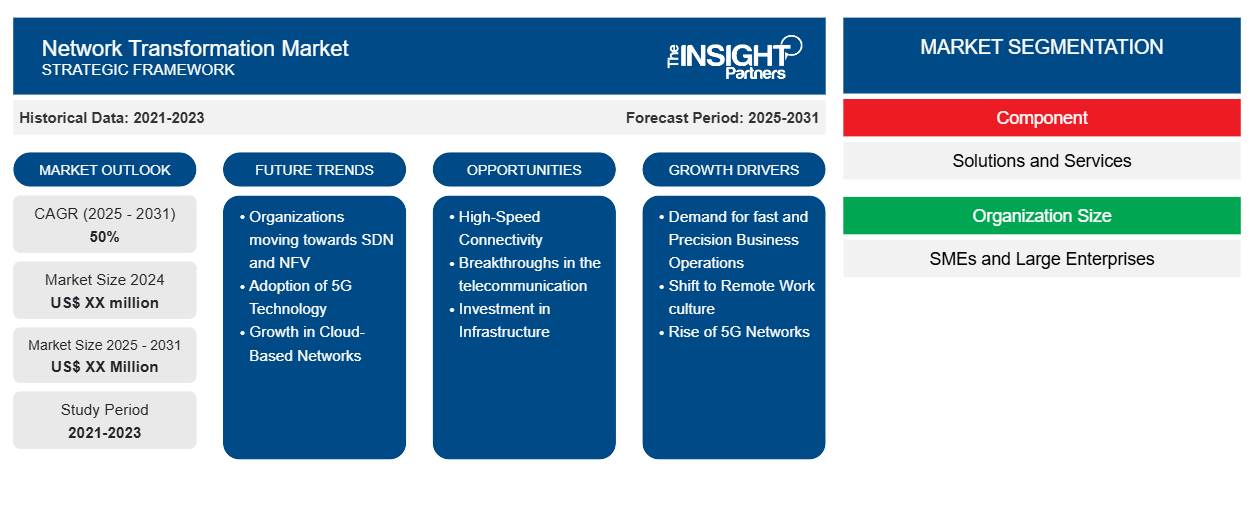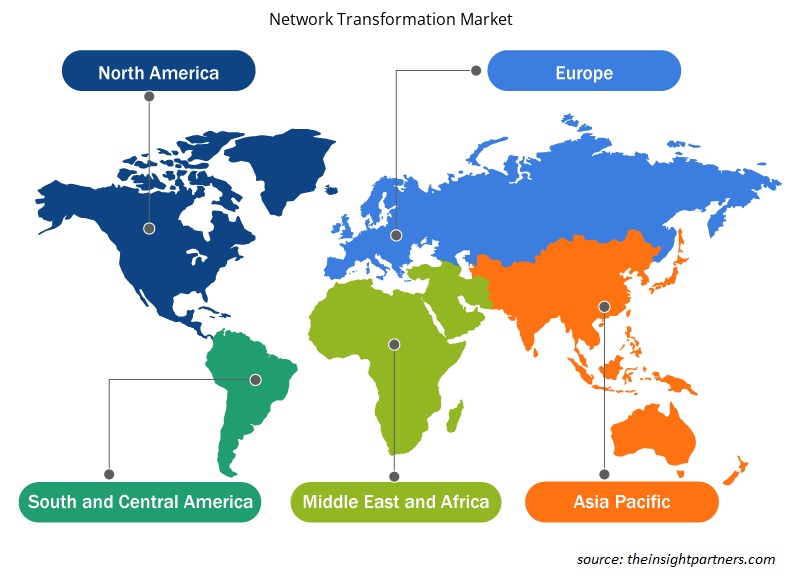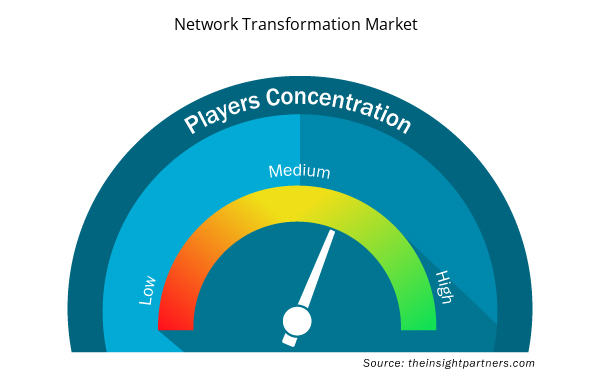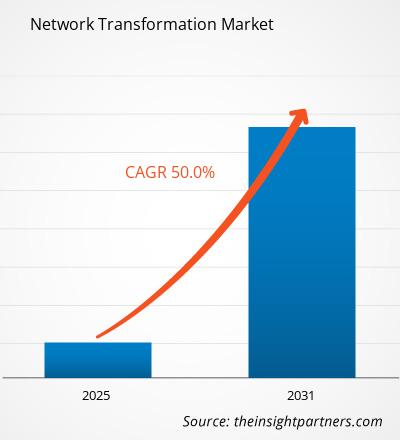The Network Transformation Market is expected to register a CAGR of 50% from 2025 to 2031, with a market size expanding from US$ XX million in 2024 to US$ XX Million by 2031.
The report also focuses on the Market for Network Transformation by Type, Deployment Model, and Region. This market is investigated in its entirety from a geographical perspective to give it a global view. In addition, a regional market, and a country-wise analysis has been performed, and presented in this report. Market elucidation is also provided in terms of the market valuations in US dollars (US$). With this, readers will be able to assess the growth pattern of each segment and have a fair idea about the competition present in the market across the globe.
Purpose of the Report
The report Network Transformation Market by The Insight Partners aims to describe the present landscape and future growth, top driving factors, challenges, and opportunities. This will provide insights to various business stakeholders, such as:
- Technology Providers/Manufacturers: To understand the evolving market dynamics and know the potential growth opportunities, enabling them to make informed strategic decisions.
- Investors: To conduct a comprehensive trend analysis regarding the market growth rate, market financial projections, and opportunities that exist across the value chain.
- Regulatory bodies: To regulate policies and police activities in the market with the aim of minimizing abuse, preserving investor trust and confidence, and upholding the integrity and stability of the market.
Network Transformation Market Segmentation
Component
- Solutions and Services
Organization Size
- SMEs and Large Enterprises
Vertical
- IT
- Energy & Utilities
- Manufacturing
- Media & Entertainment
- Telecom
Geography
- North America
- Europe
- Asia-Pacific
- South and Central America
- Middle East and Africa
Customize This Report To Suit Your Requirement
You will get customization on any report - free of charge - including parts of this report, or country-level analysis, Excel Data pack, as well as avail great offers and discounts for start-ups & universities
Network Transformation Market: Strategic Insights

- Get Top Key Market Trends of this report.This FREE sample will include data analysis, ranging from market trends to estimates and forecasts.
Network Transformation Market Growth Drivers
- Demand for fast and Precision Business Operations: The dominance of digital transformation initiatives across each of the significant domains has intensified the urgency for an upgrade of legacy infrastructure, which hits the market with a large number of organizations into the set-up of next-generation network solutions. The recent surveys suggest that nearly all of the enterprises (73% on average) are going to make a move to transform the networking backbone and that further increases the profitability of the market.
- Shift to Remote Work culture: In the wake of the ever-increasing shift from traditional work desks to a remote workforce, as well as cloud computing, the need for a strong network has only strengthened, evident from the rising trends of hybrid Working, as a majority of the global workforce (70% on an average) is bound to begin on-site, after the gradual return to on-site working environments.
- Rise of 5G Networks: The rollout of 5G networks is a significant driver of network transformation. 5G technology requires a complete overhaul of existing network architectures, leading to the adoption of software-defined networking (SDN) and network functions virtualization (NFV) to enable the scalable and flexible infrastructure required for 5G services. This is accelerating the transformation of network infrastructure globally.
Network Transformation Market Future Trends
- Organizations moving towards SDN and NFV: This trend is towards SDN and NFV, shifting organizations from the traditional hardware-based network. Organizations are moving toward SDN and NFV in order to achieve agility, scalability, and cost-effectiveness in managing networks.
- Adoption of 5G Technology: Rollout of 5G networks is forcing the necessity of network transformation to enable higher speeds, low latency, and massive connectivity for applications like IoT and edge computing.
- Growth in Cloud-Based Networks: To meet the growth of hybrid and multi-cloud environments for seamless connectivity and efficient performance, companies are being compelled to upgrade their networks.
Network Transformation Market Opportunities
- High-Speed Connectivity: The Network Transformation Market is at the core of unmet needs across various industries that rely on high-speed connectivity to enhance customer service and experience; and it finds wide application across diverse sectors such as healthcare, finance, and retail among others.
- Breakthroughs in the telecommunication: Telecom industry such as the advent of smartphones and the imminent launch of 5G along with the Internet of Things have also created new avenues for service providers to continue to innovate, enable seamless mobile connectivity, and expand the reach of the Internet of Things (IoT) applications.
- Investment in Infrastructure: Some growing markets have seen increased investment in network infrastructure, creating new growth opportunities for key players and further expanding market share. An in-depth analysis of this market gives insight into strategic areas for investment and partnership opportunities to aid stakeholders in capitalizing on growth opportunities in Network Transformation.
Network Transformation Market Regional Insights
The regional trends and factors influencing the Network Transformation Market throughout the forecast period have been thoroughly explained by the analysts at Insight Partners. This section also discusses Network Transformation Market segments and geography across North America, Europe, Asia Pacific, Middle East and Africa, and South and Central America.

- Get the Regional Specific Data for Network Transformation Market
Network Transformation Market Report Scope
| Report Attribute | Details |
|---|---|
| Market size in 2024 | US$ XX million |
| Market Size by 2031 | US$ XX Million |
| Global CAGR (2025 - 2031) | 50% |
| Historical Data | 2021-2023 |
| Forecast period | 2025-2031 |
| Segments Covered |
By Component
|
| Regions and Countries Covered | North America
|
| Market leaders and key company profiles |
Network Transformation Market Players Density: Understanding Its Impact on Business Dynamics
The Network Transformation Market market is growing rapidly, driven by increasing end-user demand due to factors such as evolving consumer preferences, technological advancements, and greater awareness of the product's benefits. As demand rises, businesses are expanding their offerings, innovating to meet consumer needs, and capitalizing on emerging trends, which further fuels market growth.
Market players density refers to the distribution of firms or companies operating within a particular market or industry. It indicates how many competitors (market players) are present in a given market space relative to its size or total market value.
Major Companies operating in the Network Transformation Market are:
- Cisco Systems, Inc.
- FUJITSU
- Hewlett Packard Enterprise Development LP
- Huawei Technologies Co., Ltd.
- IBM
Disclaimer: The companies listed above are not ranked in any particular order.

- Get the Network Transformation Market top key players overview
Key Selling Points
- Comprehensive Coverage: The report comprehensively covers the analysis of products, services, types, and end users of the Network Transformation Market, providing a holistic landscape.
- Expert Analysis: The report is compiled based on the in-depth understanding of industry experts and analysts.
- Up-to-date Information: The report assures business relevance due to its coverage of recent information and data trends.
- Customization Options: This report can be customized to cater to specific client requirements and suit the business strategies aptly.
The research report on the Network Transformation Market can, therefore, help spearhead the trail of decoding and understanding the industry scenario and growth prospects. Although there can be a few valid concerns, the overall benefits of this report tend to outweigh the disadvantages.
- Historical Analysis (2 Years), Base Year, Forecast (7 Years) with CAGR
- PEST and SWOT Analysis
- Market Size Value / Volume - Global, Regional, Country
- Industry and Competitive Landscape
- Excel Dataset


- Water Pipeline Leak Detection System Market
- Nuclear Decommissioning Services Market
- Constipation Treatment Market
- Biopharmaceutical Tubing Market
- Power Bank Market
- Aircraft Landing Gear Market
- Biopharmaceutical Contract Manufacturing Market
- Adaptive Traffic Control System Market
- Medical Second Opinion Market
- Hydrocephalus Shunts Market

Report Coverage
Revenue forecast, Company Analysis, Industry landscape, Growth factors, and Trends

Segment Covered
Component, Organization Size, and Vertical

Regional Scope
North America, Europe, Asia Pacific, Middle East & Africa, South & Central America

Country Scope
US, UK, Canada, Germany, France, Italy, Australia, Russia, China, Japan, South Korea, Saudi Arabia, Brazil, Argentina
Frequently Asked Questions
Some of the customization options available based on request are additional 3-5 company profiles and country-specific analysis of 3-5 countries of your choice. Customizations are to be requested/discussed before making final order confirmation, as our team would review the same and check the feasibility.
The report can be delivered in PDF/PPT format; we can also share excel dataset based on the request.
Key participants in this competitive market are - Cisco Systems Inc, FUJITSU, Hewlett Packard Enterprise Development LP, Huawei Technologies Co Ltd, IBM, Intel Corporation, Juniper Networks Inc, NEC Corporation, SAMSUNG
The market is expected to register a CAGR of 50% during 2023-2031
Increased demand over legacy communication systems, due to a requirement of fast, precise and exact connections in business operations, is fueling the market for Network Transformation.
Integration of SDN and NFV for enhanced connectivity, addition of network management using machine learning, improved abolity to seize new growth are key trends in network transformation market
Trends and growth analysis reports related to Technology, Media and Telecommunications : READ MORE..
The List of Companies
1. Cisco Systems, Inc.
2. FUJITSU
3. Hewlett Packard Enterprise Development LP
4. Huawei Technologies Co., Ltd.
5. IBM
6. Intel Corporation
7. Juniper Networks, Inc.
8. NEC Corporation
9. SAMSUNG
10. Telefonaktiebolaget LM Ericsson

 Get Free Sample For
Get Free Sample For